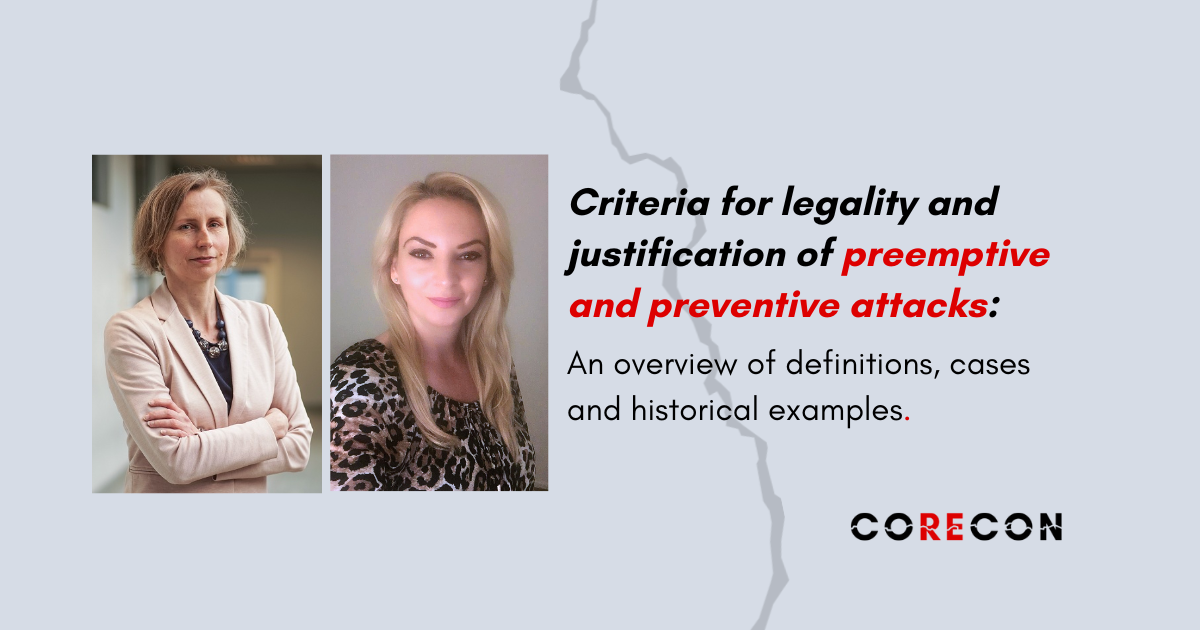This blogpost by Isabela Dragomir and Katarzyna Molek-Kozakowska is a discussion of diverse definitions of preemptive attacks vis-à-vis preventive wars, and criteria for their legality and justification. It reviews selected international legal, military and political studies to bring together the current approaches and debates and exemplifies the argument with historical examples. It is a background for a joint article on editorial strategies of neutralizing Russian justifications for war developed in CORECON.
Preemption vs. prevention
The distinction between preemption and prevention can be found in the context of international law and the “just war” doctrine. The term “preemptive war” is sometimes confused with the term “preventive war” but they have distinct characteristics and criteria. For example, according to the U.S. Department of Defense Dictionary of Military and Associated Terms (2009), a preemptive attack is defined as “an attack initiated on the basis of incontrovertible evidence that an enemy attack is imminent”, while preventive war is “a war initiated in the belief that military conflict, while not imminent, is inevitable, and that to delay would involve greater risk.”
In other words, preventive war is launched to destroy the potential threat of the enemy, when an enemy attack is not imminent or known to be planned. A preemptive war, on the other hand, is launched in anticipation of immediate aggression. While fundamental to “just war” doctrine, the concepts of “belief” or “anticipation” may be quite subjective starting points for armed action.
Senator Edward Kennedy: “preemptive self-defense would be legitimate self-defense, while preventive self-defense would denote a form of defense against threats which are neither imminent nor can be proved.”
(October 7, 2002)
Despite rivaling definitions, preemption and prevention have been the leading concepts of the start of the 21st century, due to their omnipresence in public discourse – and relevance for political and military decisions from Iraq to Ukraine.
Imminence of threat
A clear distinction between preemptive and preventive war is often drawn in terms of imminence of threat, with preemption apparently being an act of war where the enemy’s attack is really imminent, or already ongoing, and with preventive war instead being an act of war happening at a future time, being validated as a strategic action taken to avert a future threat, which is determined by a presumed or hypothetical advantage of the attacker.
Back in 1995, Dan Reiter defined a preemptive war as a war that ‘‘breaks out primarily because the attacker feels that it will itself be a target of a military attack in the short term.’’ In 2008, Sanjay Gupta further argued that both sides might feel better off attacking, especially if the other side was seen to be contemplating such an attack. By contrast, in the preventive war case, only one side to the confrontation would at any particular time be inclined to start the war.
Timing and opportunity
In his 2007 report, Colin Gray aimed at improving the theoretical understanding of preventive war. He argues that preventive war is “simply war, distinguished only by its timing” and enumerates the principal criteria for just preventive action: “Force must be the last resort, not temporally, but with reference to the expected failure of other policy instruments. The condition to be prevented by force has to be judged too dangerous to tolerate. The benefits of preventive military action must be expected to be far greater than the costs. There has to be a high probability of military success.”
The term preemption can also be located in the context of the maneuvrist approach, according to the revised British Army Doctrine Publication (2017), an official military document underlining the legality of land operations. “Pre-emption is to seize an opportunity, which may itself be fleeting, to deny the enemy an advantage before they act. It denies them the initiative and frustrates their plan. Its success lies in the speed with which the situation can be subsequently exploited.”
The reference to an action aimed at “seizing the opportunity,” while “denying the enemy an advantage before they act” illustrates the concept of anticipation, gaining the initiative, and ultimately disrupting the adversary’s offensive. The characterization of the opportunity as “fleeting” is an indication of the immediate and imminent dimension of an attack that requires preemptive measures.
Ethics and justice
A discussion that might ethically justify the choice of preemptive war should start from a revisit of the “just war” theory, a military doctrine aimed to confirm whether a war is morally justifiable based on a series of criteria. First of all, a nation state must be aggressed before taking any action.
Article 51 of the Charter of the United Nations: “Nothing in the present Charter shall impair the inherent right of individual or collective self-defense if an armed attack occurs against a Member of the United Nations, until the Security Council has taken measures necessary to maintain international peace and security.”
Secondly, based on the criterion of right intention, a nation-state must only engage in war with the intention of achieving its previously established justified cause. The third criterion stipulates that the initiative must be backed up by proper authority and that a public declaration of a state of hostilities should enforce the authorization. Following the required procedures in this context includes the provision that the citizens of the involved nation-states be informed of the impeding risk. The fourth criterion requires that war be seen as a last resort. The only condition under which a state may resort to war is if that nation-state has taken every possible action, considered a peaceful alternative to violence. The fifth criterion discusses the probability of success in achieving the just cause of war.
Nation-states cannot ethically resort to war if they are unable to predict a likelihood of success. Furthermore, if the action that would be undertaken is unlikely to have a significant impact on the possibility of fully achieving the war goal to completion, the attempt itself is unethical. The rationale behind this provision is to prevent a worthless mass use of force.
Finally, the sixth criterion indicates there should be a proportionality of good. A nation-state that goes to war must ponder the good that would likely result from a war to the bad that would likely come of it before declaring it. Weighing the likely outcomes of a war must consider potential casualties and economic consequences that would affect people’s lives. The only time when a war is ethically permissible is when the good of war is expected to outweigh the bad of inaction. According to the Just War Theory, for a war to be ethical, all six of these criteria must be fulfilled.
Is preemption ever justified?
According to the above, preemptive war cannot be ethical, given that it undoubtedly breaks the fifth and sixth provisions of the “just war” doctrine. Since the fifth criterion requires that a declaration of war must be an absolute last resort, by definition, preemptive war is not a last resort as other options are always possible before the first shots are fired. Furthermore, the justification of proportionality is also invalid, since all preemptive warfare is a combined worse option in terms of the number of casualties and damage to quality of life, than inaction.
International literature offers two justifications of the preemptive use of force, necessity and proportionality.
The condition of necessity as expressed in The Caroline Case prompts that the need for self-defense is immediate, exceptional, and there is no time to negotiate it. The Caroline Case of 1841 was an assault on the battleship Caroline by a British warship, on the grounds that Caroline’s ship had transported armaments and rebels against the Canadian government, which led to the killing of two United States citizens. There had been no previous armed attacks carried out by the Caroline ship against British warships. The diplomatic crisis was defused during the negotiations of several US–UK disputes that led to the Webster-Ashburton Treaty in 1842. The incident was used to establish the principle of “anticipatory self-defense” in international relations, which holds that it may be justified only in cases in which the “necessity of that self-defense is instant, overwhelming, and leaving no choice of means, and no moment for deliberation” (see Brower-Freeman for more details on this case).
Therefore, the act of self-defense should not be unreasonable and only justified by the needs of self-defense. Based on this logic, a preemptive war would violate international law given that the attack had not happened.
The risks of unilateralism and destabilization
In the international arena, there are voices that warn against the unilateral decision of a nation-state to engage in preemptive measures. According to Michael Reisman and Andrea Armstrong, “the claim to preemptive self-defense is a claim to entitlement to use unilaterally, without prior international authorization, high levels of violence to arrest an incipient development that is not yet operational or directly threatening, but that, if permitted to mature, could be seen by the potential preemptor as susceptible to neutralization only at a higher and possibly unacceptable cost to itself.”
Independently of the provisions of international law on the acceptability of self-defense measures, states have the absolute right to protect their territorial sovereignty through acts of self-defense. However, if to unilaterally carry out preemptive acts of self-defense is a right, then the acts of hostility are justified by the anticipation of the occurrence of a new development that has not yet taken place. Although this falls under the generally accepted definition of preemption, Reisman and Armstrong claim that preemptive actions must be carried out by considering the risk of impact that will occur, and not doing so violates the principle of proportionality.
Military researchers, such as Ivo Daadler and John Mitchell also highlight that it is the U.S. that – by attacking Afghanistan and Iraq in the early 2000s – sanctioned preemption/prevention in modern military strategy. While the debate over the wisdom and consequences of those actions continues, the questions arise whether the federal government possessed the power under the Constitution to wage preemptive war and whether the U.S. challenged the contemporary rules governing the use of force by acting without the support of most major world powers. The threat of WMD was one of the most frequently used arguments justifying the preemptive use of force, but it also established a dangerous precedent within the international community.
Politically, according to Jonathan Wilcox (2010), the reliance on preventive war may have doomed America’s efforts to control the spread of nuclear weapons to rogue states and set a bad example to other strong states that they could attack preemptively on the perceived threat to their vital interests. The literature indicates the constitutional, ethical, but above all political consequences of preemption. For example, the U.S., instead of ensuring security, further destabilized the region and destroyed its reputation as peacekeeper. The criticism of preemption/prevention in the case of Russia can come not only from theory and law, but also from the destabilizing consequences and human and material costs of preemption.
Conclusion
Based on the above-made distinctions between preemptive and preventive war, the underlining characteristics of the two concepts could be compared in the following table:
| Preemptive War | Preventive War | |
|---|---|---|
| Timing of threat | Immediate and imminent | Future and potential |
| Justification | Self-defense against an imminent attack | Strategic action to prevent a future threat |
| Legality | Generally more accepted under international law | Highly controversial and often considered illegal |
| Ethical concerns | Accuracy and proportionality of threat response | Justification based on hypothetical threats |
| Consequences | Likely self-defense, avoidance of full-scale war | Likely destabilization, possibility of long-term conflict |
Selected readings
Brower-Freeman, Brenden. 2013. The Ethics of Preemptive Warfare. JCCC Honors Journal 5(1): 1-21.
Daalder, Ivo H. (ed.) 2007. Beyond Preemption: Force and Legitimacy in a Changing World. Washington, DC: Brookings Institution Press.
Gray, Collin S. 2007. The Implications of Preemptive and Preventive War Doctrines: A Reconsideration. US Army War College Press.
Gupta, Sanjay. 2008. The Doctrine of Pre-emptive Strike: Application and Implications During the Administration of President George W. Bush. International Political Science Review 29(2): 181-196.
Mitchell, John B. 2004. Preemptive War: Is it Constitutional? Santa Clara Law Review 44: 497.
Reisman, W. Michael, and Andrea Armstrong. 2006. The Past and Future of the Claim of Preemptive Self-Defense. The American Journal of International Law 100(3): 525–550.
Reiter, Dan. 1995. Exploding the Powder Keg Myth: Preemptive Wars Almost Never Happen. International Security 20(2): 5–34.
Wilcox, Jonathan P. 2010. Legitimacy in the Conduct of Military Operations Short of General War. Perspectives on the Use of Military Power in the 21st Century. Edited by Harry R. Yarger. pp. 9-22. Carlisle, PA: Strategic Studies Institute, U.S. Army War College.





